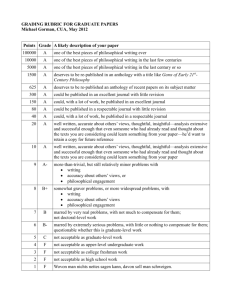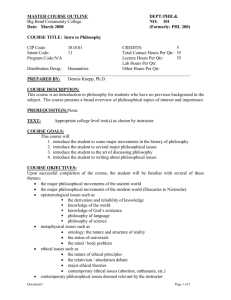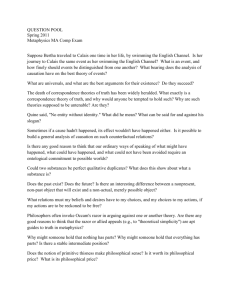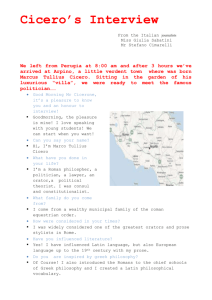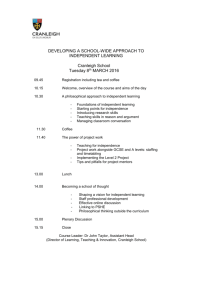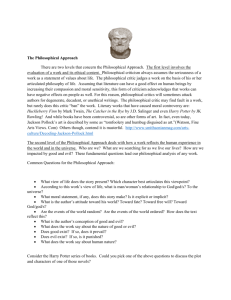Contemporary Philosophy: Post-structuralism and
advertisement
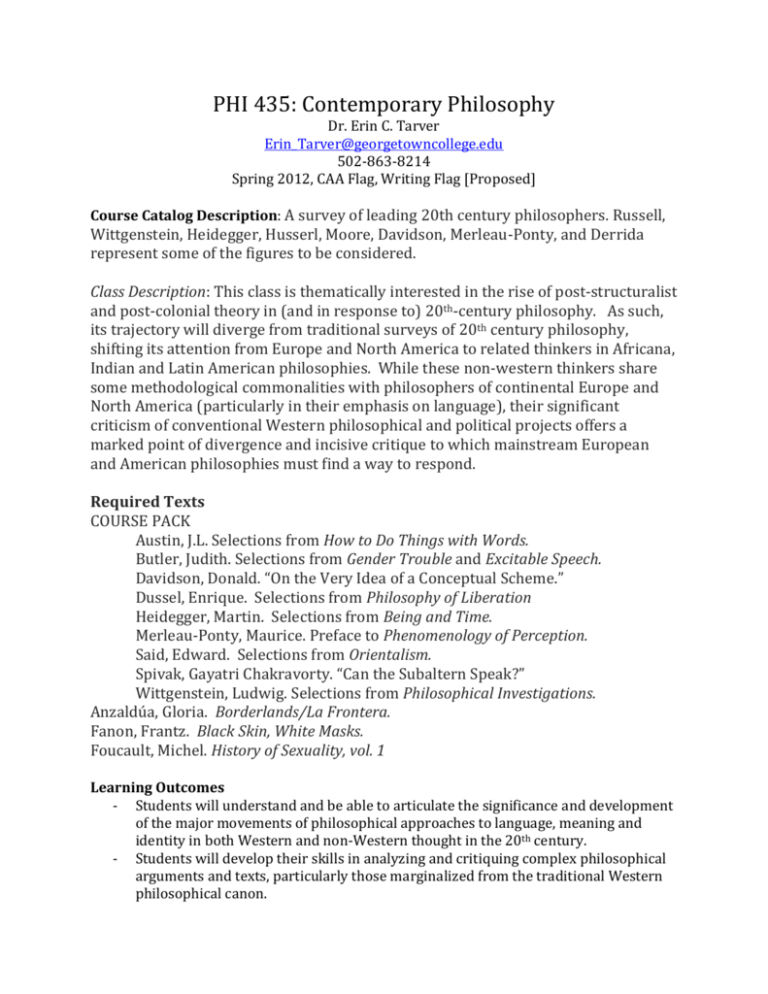
PHI 435: Contemporary Philosophy Dr. Erin C. Tarver Erin_Tarver@georgetowncollege.edu 502-863-8214 Spring 2012, CAA Flag, Writing Flag [Proposed] Course Catalog Description: A survey of leading 20th century philosophers. Russell, Wittgenstein, Heidegger, Husserl, Moore, Davidson, Merleau-Ponty, and Derrida represent some of the figures to be considered. Class Description: This class is thematically interested in the rise of post-structuralist and post-colonial theory in (and in response to) 20th-century philosophy. As such, its trajectory will diverge from traditional surveys of 20th century philosophy, shifting its attention from Europe and North America to related thinkers in Africana, Indian and Latin American philosophies. While these non-western thinkers share some methodological commonalities with philosophers of continental Europe and North America (particularly in their emphasis on language), their significant criticism of conventional Western philosophical and political projects offers a marked point of divergence and incisive critique to which mainstream European and American philosophies must find a way to respond. Required Texts COURSE PACK Austin, J.L. Selections from How to Do Things with Words. Butler, Judith. Selections from Gender Trouble and Excitable Speech. Davidson, Donald. “On the Very Idea of a Conceptual Scheme.” Dussel, Enrique. Selections from Philosophy of Liberation Heidegger, Martin. Selections from Being and Time. Merleau-Ponty, Maurice. Preface to Phenomenology of Perception. Said, Edward. Selections from Orientalism. Spivak, Gayatri Chakravorty. “Can the Subaltern Speak?” Wittgenstein, Ludwig. Selections from Philosophical Investigations. Anzaldúa, Gloria. Borderlands/La Frontera. Fanon, Frantz. Black Skin, White Masks. Foucault, Michel. History of Sexuality, vol. 1 Learning Outcomes - Students will understand and be able to articulate the significance and development of the major movements of philosophical approaches to language, meaning and identity in both Western and non-Western thought in the 20th century. - Students will develop their skills in analyzing and critiquing complex philosophical arguments and texts, particularly those marginalized from the traditional Western philosophical canon. - Students will develop their skills in verbally communicating philosophical positions and in using collaborative discussions to advance philosophical knowledge. Students will learn to effectively and constructively critique their own and others’ philosophical writing. Grading Term Paper (12-15 pgs) Paper Workshop Participation Reading Reflection Papers (10) Presentation/Seminar Facilitation Discussion Participation Final Exam 30% 5% 20% 10% 15% 20% Grading Scale 92 – 100 = A 87 – 92 = A/B 82 – 87 = B 77 – 82 = B/C 70 – 77 = C 60 – 70 = D < 60 = F ‘W’ Credit Information Students must complete their Essential Proficiency writing requirements before they can receive credit for a Flagged Writing class. Students may receive writing credit for no more than one Writing Flag in any one semester. Because the ability to write carefully reasoned, analytical, and critical essays is indispensible both for the practice of philosophy and for the completion of a well-rounded liberal arts education, the assignments in this class are specifically designed to cultivate and improve upon students’ writing skills. Assignments Term Paper You will write an argumentative philosophical paper on a topic of your choice (though topics must be concerned with one or more of the major texts we read in this class, and all papers must, at minimum, respond to one of the non-Western thinkers we encounter). A topic proposal (including a paragraph abstract and a detailed outline) must be submitted before the Thanksgiving break, which I will return with written feedback. I strongly encourage you to come chat with me about your topic before writing the proposal—while I want you to feel free to think creatively and independently about your topic, I may be able to provide guidance on potential outside sources to consider, or offer advice on fine-tuning an argument. Your final paper should make use of (and properly cite) at least 3 secondary sources (beyond the primary text that is your topic). Term papers will be graded both on the quality of writing they use and the quality of their philosophical content. Paper Workshop Participation One of the most valuable philosophical skills to learn is the ability to read and comment critically upon others’ work, while likewise accepting and learning from criticism of one’s own work. We’ll practice both in this workshop. To participate fully in the workshop, you’ll need to bring a substantial working draft of your final paper. This doesn’t need to be a full-length draft, but it should at least include your revised, detailed outline, a clear statement of your thesis, and at least three pages of text. Reading Reflection Papers (RR) You’ll have reading assigned for each class, which you’ll need to have completed prior to coming to our seminar. Additionally, 10 different times during the semester, you’ll write a short (approximately 2 pages) reflection paper on the assigned reading—usually guided by a question I pose in advance. Presentation/Seminar Facilitation Each student in the course will be responsible for giving a short (approx. 15 minute) presentation and taking a leadership role in that day’s seminar discussion. To ensure that this runs smoothly, you’ll need to create a Moodle forum post at least one day prior to your presentation day that indicates 1) the guiding questions you’d like us all to think about for your presentation day and 2) some analytical and/or critical comments of your own that you’d like us to discuss together (does the author or text you’re discussing have a more or less satisfactory answer to some question we’ve seen before during the semester? Is there an unresolved philosophical tension in some central claims of the text? Does the text throw some particularly interesting or useful light on an external or real-world concern?) Discussion Participation As you no doubt know by now, Philosophy is best done conversationally—so it’s incredibly important that everyone in this class think of themselves as semester-long conversation partners, rather than simply as students who come to sit in (or, heaven forbid, hide in the back of) class. It’s also important to note that the best conversations happen when we all take care to prepare for them—which means that your job in this class is not just to speak up, but to come prepared (i.e., having done the reading) to contribute helpfully to our general classroom experience. Thus, to get good marks in this component, you’ll need to do the following things: - Come to class regularly, and do not miss more than 3 classes. - Contribute positively to the general class discussion in a way that demonstrates critical philosophical engagement - Abide by the Classroom Conduct policy (see below) Final Exam The exam for this course will take an essay format, and will be cumulative over the entirety of the course material. Schedule Week 1: Heidegger Week 2: Merleau-Ponty Week 3: Wittgenstein and Austin Week 5-6: Fanon Week 7: Davidson and Said Week 8-9: Foucault Week 10-11: Anzaldúa Week 12: Spivak Week 13: Butler Week 14: Dussel Week 15: Spivak/Butler/Dussel contd. Classroom Conduct: We’re going to talk quite a bit about arguments in this class—and we’ll definitely have a few of our own!—but that doesn’t mean that we don’t have ground rules. In fact, being respectful of one another, even when we disagree, is absolutely crucial to making this an environment in which everyone can learn. There are several ways we can show one another respect; the following are the ones I insist upon: - We may attack ideas, but never people. Listen to others when they’re talking. Never use cell phones or computers in the classroom. Any other ground rules we agree upon as a group Academic Honesty Academic Honesty is extremely important, and so violations of the Georgetown College Honor System will not be tolerated. I will not hesitate to fail a student for the course for such violations. Infractions of the Honor System include plagiarism, cheating, stealing, and lying related to academic matters. Definitions of these infractions are available in the Georgetown College Student Handbook. Disability Access I encourage any students with disabilities that may impact their access to or performance in any component of this course to talk with me or Disability Support Services as soon as possible. Disability Support Services is located in the Student Wellness Center.

